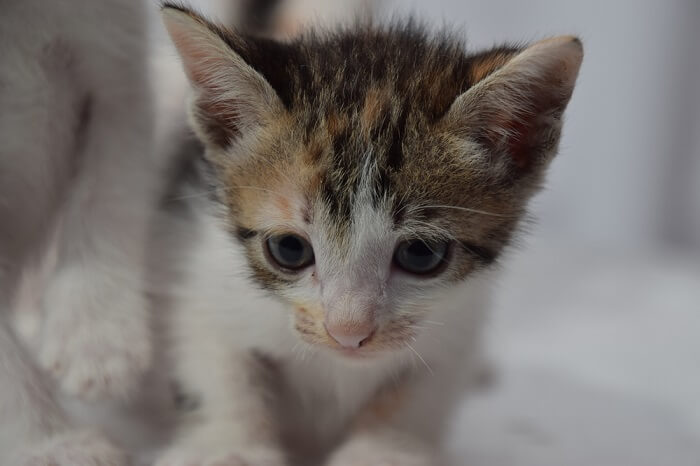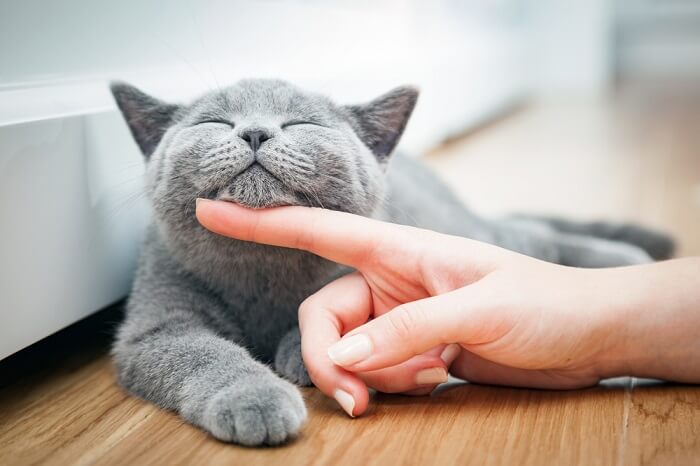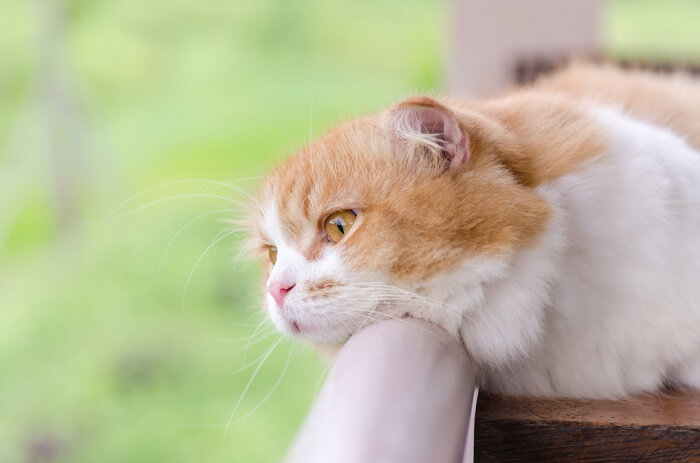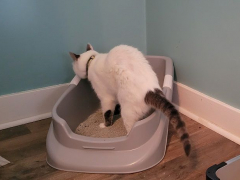
Amitriptyline is a medication used often for cats to treat a variety of behavioral disorders, as well as a couple of other conditions. In this article you’ll learn what amitriptyline does for cats, common side effects, and some frequently asked questions.
Amitriptyline For Cats Overview

About Amitriptyline for Cats
Amitriptyline is an antidepressant medication. It goes by the brand name Elavil and is also available as a generic. It is commonly used to treat cats for behavior disorders including stress or anxiety-related inappropriate urination and other stress-related behavioral problems.
Other stress-related behavior problems in cats can include (but not be limited to) excessive grooming or barbering, ingesting non-edible items (which is termed “pica”), hiding, conflicts with housemates, and defecating outside of the litterbox.
It has also been found useful as an added medication to treat cats for itching and scratching that doesn’t respond well to other medications.
A veterinarian may also consider it for certain types of chronic pain, usually associated with neuropathic, or nerve-related pain, especially if some other primary pain medications have been tried already.
Also Read: How To Stop Cats From Scratching Furniture
What Does Amitriptyline Do for Cats?

Amitriptyline increases serotonin levels in cats, helps with overactive urinary behavior, and brings relief to some cats with itchy or oversensitive skin.
Amitriptyline is classified as a tricyclic antidepressant. It can have several effects on neurotransmitters including blocking serotonin and norepinephrine reuptake, which increases their levels. Increasing serotonin can help to stabilize mood and feelings of well-being. Low levels of norepinephrine can be associated with depression, anxiety, and stress.
Amitriptyline also has some anticholinergic activity, meaning it can block some effects of the transmitter acetylcholine. The greatest benefit for cats with this drug activity is reducing overactivity of the smooth muscle of the urinary tract, which can help with overactive urinary behavior, and hyperactivity of the nerve-muscle junctions in the skin, helping to bring relief to some cats with itchy or oversensitive skin.
It also has some activity against mast cells, a type of inflammatory cell seen in some cases of itchy, irritated skin.
Lastly, it can block another neurotransmitter pathway called an alpha-1 adrenergic receptor. Amitriptyline’s activity as an alpha-blocker can benefit cats by reducing fear and startle response, as well as relaxing the smooth muscle in the urinary tract. Another drug with a similar effect used for cats with lower urinary tract disease signs is prazosin.
While some clinicians feel it is controversial to use an alpha-blocker in cats to help them with urinary tract signs because there are minimal official research studies to support it, others feel there is a great deal of clinical evidence, and has been for a long time, to support the continued use of drugs like amitriptyline and prazosin for this purpose.
Also Read: Mast Cell Tumors In Cats: Symptoms, Diagnosis & Treatment
Side Effects of Amitriptyline for Cats
While commonly well-tolerated by most cats, amitriptyline does have a variety of effects on the body meaning there can be a variety of side effects seen.
The most common side effect seen in cats is sedation. Other side effects can include hypersalivation (drooling), a decrease in urinary output, poor appetite, vomiting or nausea, constipation, dry mouth, and disorientation and balance issues.
Uncommonly, signs like hyperexcitability and agitation may be seen.
Some bloodwork changes have also sometimes been seen, including lower platelet counts (a cell used for clotting function), lower neutrophil counts (a type of white blood cell), and a decrease in thyroid levels. This medication should also be used cautiously in cats with kidney disease or liver disease. For these reasons, a veterinarian may recommend blood work prior to starting amitriptyline.
As abnormal heart rhythms can sometimes also be seen, your vet may also recommend an electrocardiogram (ECG) to ensure your kitty has normal heart rhythms prior to starting therapy.
Overdoses of amitriptyline can be potentially serious, as high doses can lead to severe lethargy, incoordination, vomiting, and heart rhythm abnormalities. It is suggested that if any concerns for an overdose or adverse effects from amitriptyline occur, to contact a veterinary toxicologist either through ASPCA Animal Poison Control (1-888-426-4435) or the Pet Poison Helpline (1-855-764-7661). A fee does apply, but your vet will often need the toxicologist’s advice to help develop a treatment plan for your cat.
There are a large number of medications that should not be used with amitriptyline or should be used carefully. It is best to consult with your veterinarian when considering amitriptyline to discuss any potential interactions with another medication your kitty is currently taking.
Also Read: Drug Poisoning In Cats: Causes, Symptoms, & Treatment
Amitriptyline for Cats Dosage

Amitriptyline is ideally given with food for the best absorption and it is important to not discontinue amitriptyline abruptly.
Amitriptyline does not carry a label for cats and so is used in an off-label manner, which is common for many generic medications in veterinary medicine. Because of this and because of drug interactions with other medications and the potential for concerning side effects if amitriptyline is used incorrectly, it is best to consult with your veterinarian on the best dosing recommendation for your cat.
Amitriptyline is ideally given with food for the best absorption. It is important, as with most medications that affect neurotransmitter function in the brain, to not discontinue amitriptyline abruptly. Your vet can provide instructions to wean your kitty of this medication properly if needed.
Conclusion
Amitriptyline is a medication that can be very helpful for cats, especially for abnormal behaviors stemming from stress or anxiety. It is often well-tolerated by most cats, but should be dosed and used carefully. If you feel your cat could benefit from amitriptyline or if your kitty is currently on this medication and you have questions or concerns, make sure to discuss with your vet.
Drug Dosing Disclaimer: We are only able to provide doses for medications that are FDA approved for use in cats and only as the label guidelines dictate. For medications that are used off-label we can only provide guidelines and safety information for use. Safe and appropriate dosing for off-label medications can only be determined by a primary care veterinarian.
We encourage you to work with your veterinarian to determine if a particular medication is appropriate for your cat. Changing or adjusting a dose for your cat on your own without consulting with a veterinarian can carry risk. We do not encourage use of medications prescribed for human use in pets without first consulting with a primary care veterinarian.
Frequently Asked Questions
How Long Does it Take for Amitriptyline to Work in Cats?
Amitriptyline is rapidly absorbed when given orally and can reach peak drug concentrations in just an hour or two in cats. However, as with many medications that work on neurotransmitters in the brain to alter behavior and mood, it can take several days or even weeks to determine if the medication is effective.
What are the Side Effects of Amitriptyline in Cats?
Common side effects in cats can include signs of drowsiness or sedation. The effects on smooth muscle can reduce inappropriate urinary behavior, but can also lead to urinary retention as well as slowing down GI motility, leading to constipation.







